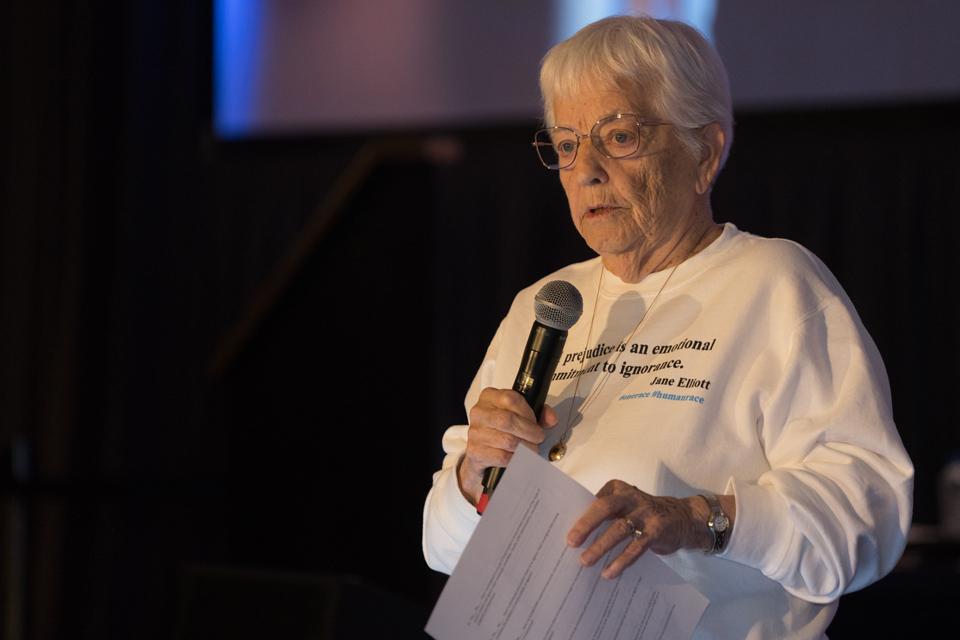Keith Boykin and Jane Elliot inspire delegates to continue fight for racial and social justice
By Emily Wilson
Keynote speakers at the CFT Convention included political commentator and white House aide to President Bill Clinton, Keith Boykin, and anti-racism activist Jane Elliot.
Boykin started off by saying education was in his blood and thanked school workers including crossing guards to the janitors, nurses, substitute teachers, guidance counselors. He called out some particular teachers, such as his speech and debate coach who encouraged him not to slouch, a history teacher who let him advocate for social justice, and a Harvard law school professor who resigned over the school’s failure to hire women of color.
“Each of these people shaped me into the person I am today,” he said. “None of us would be here without dedicated service of our teachers.”
Boykin went on to talk about how education is under attack because “narrow minded political actors have chosen to exploit children for cynical political goals,” how diversity is a strength, and encouraged people to fight back.
He told a story about protesting the lack of diversity in the Harvard faculty and running after the dean who was ignoring Boykin’s attempts to talk with him. A Boston Globe photographer snapped a picture of Boykin sprinting after the dean, and it ended up in the paper.
This experience made him an activist, Boykin said, and the group filed an unprecedented lawsuit against the school. Although they lost in court, Boykin claimed they won in the court of public opinion. The school went on to hire the first woman of color on the faculty and two women deans — including now Supreme Court Justice Elena Kagan.
“Change is possible,” Boykin said. “Even as forces aligned against us expect us to retreat and surrender.”
We have to keep working for change, Boykin told the delegates.
“The reason I mention Dr. King so often is he says so beautifully in that letter for Birmingham Jail that time is neutral,” he said. “But time doesn’t force change to happen by itself. It happens because we decide to make that change happen. It happens because good people of good will decide to be engaged. It happens because people in this room decided to come to this conference and stand up and speak out and be informed about their rights and how we can protect not only teachers. but society and democracy at large.”
Dr. King also had a profound effect on Elliot, who ran her “Blue Eyes/Brown Eyes Exercise,” the day after he was assassinated, treating the brown eyed students as superior to those with blue eyes to show the effects of unconscious racism. Elliot shared some things she’s learned in her work, including that people aren’t Black or White, but different shades of Brown. Don’t use the word “privileged,” but rather say “unearned advantage.” And when people call you a “bitch,” know that stands for “being in total control, honey.”
Elliot started by asking CFT Vice President Lacy Barnes and CFT
President Jeff Freitas to stand on stage with her and asked
delegates what differences they saw. People mentioned hair,
height and color. Elliot asked Barnes and Freitas if those things
were important to them, making the point about people’s unearned
advantages, and how things beyond our control give us
power.
Elliot also pointed out racism in an unlikely place — maps. She showed the Mercator map, often in school classrooms, which distorts other countries to put the United States in the middle. “This map is a lie,” she said. She encouraged the delegates to get the Peters map, which presents countries in their true proportion to one another.
Elliot first did the Blue Eyes/Brown Eyes experiment in 1968. More than 50 years later, she continues to fight racism.

